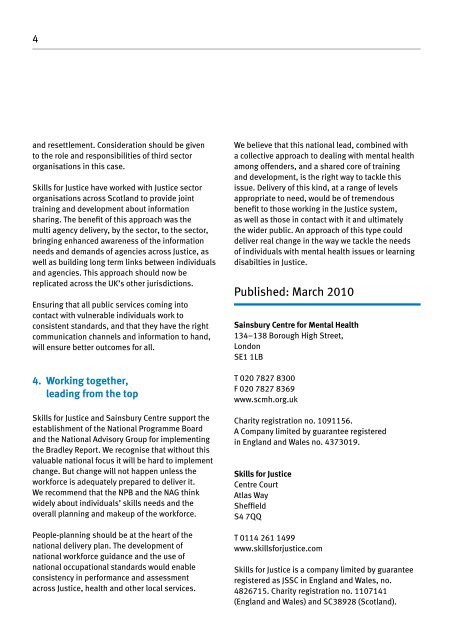The Bradley Report and the Criminal Justice workforce - Centre for ...
The Bradley Report and the Criminal Justice workforce - Centre for ... The Bradley Report and the Criminal Justice workforce - Centre for ...
4and resettlement. Consideration should be givento the role and responsibilities of third sectororganisations in this case.Skills for Justice have worked with Justice sectororganisations across Scotland to provide jointtraining and development about informationsharing. The benefit of this approach was themulti agency delivery, by the sector, to the sector,bringing enhanced awareness of the informationneeds and demands of agencies across Justice, aswell as building long term links between individualsand agencies. This approach should now bereplicated across the UK’s other jurisdictions.Ensuring that all public services coming intocontact with vulnerable individuals work toconsistent standards, and that they have the rightcommunication channels and information to hand,will ensure better outcomes for all.4. Working together,leading from the topSkills for Justice and Sainsbury Centre support theestablishment of the National Programme Boardand the National Advisory Group for implementingthe Bradley Report. We recognise that without thisvaluable national focus it will be hard to implementchange. But change will not happen unless theworkforce is adequately prepared to deliver it.We recommend that the NPB and the NAG thinkwidely about individuals’ skills needs and theoverall planning and makeup of the workforce.People-planning should be at the heart of thenational delivery plan. The development ofnational workforce guidance and the use ofnational occupational standards would enableconsistency in performance and assessmentacross Justice, health and other local services.We believe that this national lead, combined witha collective approach to dealing with mental healthamong offenders, and a shared core of trainingand development, is the right way to tackle thisissue. Delivery of this kind, at a range of levelsappropriate to need, would be of tremendousbenefit to those working in the Justice system,as well as those in contact with it and ultimatelythe wider public. An approach of this type coulddeliver real change in the way we tackle the needsof individuals with mental health issues or learningdisabilties in Justice.Published: March 2010Sainsbury Centre for Mental Health134–138 Borough High Street,LondonSE1 1LBT 020 7827 8300F 020 7827 8369www.scmh.org.ukCharity registration no. 1091156.A Company limited by guarantee registeredin England and Wales no. 4373019.Skills for JusticeCentre CourtAtlas WaySheffieldS4 7QQT 0114 261 1499www.skillsforjustice.comSkills for Justice is a company limited by guaranteeregistered as JSSC in England and Wales, no.4826715. Charity registration no. 1107141(England and Wales) and SC38928 (Scotland).
- Page 1 and 2: The Bradley Report andthe Criminal
- Page 3: 3how to deal with them, such as pri
4<strong>and</strong> resettlement. Consideration should be givento <strong>the</strong> role <strong>and</strong> responsibilities of third sectororganisations in this case.Skills <strong>for</strong> <strong>Justice</strong> have worked with <strong>Justice</strong> sectororganisations across Scotl<strong>and</strong> to provide jointtraining <strong>and</strong> development about in<strong>for</strong>mationsharing. <strong>The</strong> benefit of this approach was <strong>the</strong>multi agency delivery, by <strong>the</strong> sector, to <strong>the</strong> sector,bringing enhanced awareness of <strong>the</strong> in<strong>for</strong>mationneeds <strong>and</strong> dem<strong>and</strong>s of agencies across <strong>Justice</strong>, aswell as building long term links between individuals<strong>and</strong> agencies. This approach should now bereplicated across <strong>the</strong> UK’s o<strong>the</strong>r jurisdictions.Ensuring that all public services coming intocontact with vulnerable individuals work toconsistent st<strong>and</strong>ards, <strong>and</strong> that <strong>the</strong>y have <strong>the</strong> rightcommunication channels <strong>and</strong> in<strong>for</strong>mation to h<strong>and</strong>,will ensure better outcomes <strong>for</strong> all.4. Working toge<strong>the</strong>r,leading from <strong>the</strong> topSkills <strong>for</strong> <strong>Justice</strong> <strong>and</strong> Sainsbury <strong>Centre</strong> support <strong>the</strong>establishment of <strong>the</strong> National Programme Board<strong>and</strong> <strong>the</strong> National Advisory Group <strong>for</strong> implementing<strong>the</strong> <strong>Bradley</strong> <strong>Report</strong>. We recognise that without thisvaluable national focus it will be hard to implementchange. But change will not happen unless <strong>the</strong><strong>work<strong>for</strong>ce</strong> is adequately prepared to deliver it.We recommend that <strong>the</strong> NPB <strong>and</strong> <strong>the</strong> NAG thinkwidely about individuals’ skills needs <strong>and</strong> <strong>the</strong>overall planning <strong>and</strong> makeup of <strong>the</strong> <strong>work<strong>for</strong>ce</strong>.People-planning should be at <strong>the</strong> heart of <strong>the</strong>national delivery plan. <strong>The</strong> development ofnational <strong>work<strong>for</strong>ce</strong> guidance <strong>and</strong> <strong>the</strong> use ofnational occupational st<strong>and</strong>ards would enableconsistency in per<strong>for</strong>mance <strong>and</strong> assessmentacross <strong>Justice</strong>, health <strong>and</strong> o<strong>the</strong>r local services.We believe that this national lead, combined witha collective approach to dealing with mental healthamong offenders, <strong>and</strong> a shared core of training<strong>and</strong> development, is <strong>the</strong> right way to tackle thisissue. Delivery of this kind, at a range of levelsappropriate to need, would be of tremendousbenefit to those working in <strong>the</strong> <strong>Justice</strong> system,as well as those in contact with it <strong>and</strong> ultimately<strong>the</strong> wider public. An approach of this type coulddeliver real change in <strong>the</strong> way we tackle <strong>the</strong> needsof individuals with mental health issues or learningdisabilties in <strong>Justice</strong>.Published: March 2010Sainsbury <strong>Centre</strong> <strong>for</strong> Mental Health134–138 Borough High Street,LondonSE1 1LBT 020 7827 8300F 020 7827 8369www.scmh.org.ukCharity registration no. 1091156.A Company limited by guarantee registeredin Engl<strong>and</strong> <strong>and</strong> Wales no. 4373019.Skills <strong>for</strong> <strong>Justice</strong><strong>Centre</strong> CourtAtlas WaySheffieldS4 7QQT 0114 261 1499www.skills<strong>for</strong>justice.comSkills <strong>for</strong> <strong>Justice</strong> is a company limited by guaranteeregistered as JSSC in Engl<strong>and</strong> <strong>and</strong> Wales, no.4826715. Charity registration no. 1107141(Engl<strong>and</strong> <strong>and</strong> Wales) <strong>and</strong> SC38928 (Scotl<strong>and</strong>).



